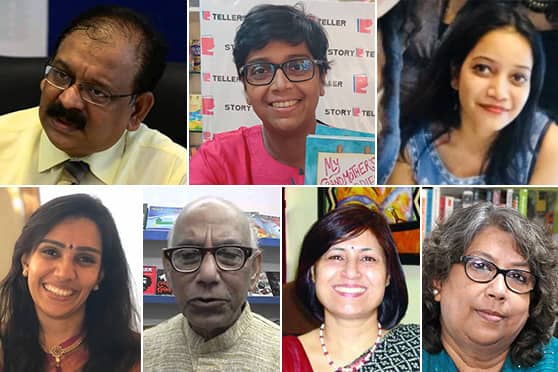Kolkata Literature Festival discusses pandemic effect on children’s reading, schooling


The ‘Impact of the Pandemic on Children’s Reading and Schooling’ was the focus of one of the sessions at the Kolkata Literature Festival, part of the Kolkata International Book Fair.
The speakers included Madhurima Vidyarthi, a doctor-turned-author; Seema Sapru, the principal of The Heritage School; Nupur Agrawal, illustrator; Sasthipada Chattopadhyay, author; Priya Narayanan, children’s author; and John A. Bagul, the principal of South City International School. They were in conversation with Sujata Sen, the director of the Kolkata Literature Festival.
Highlights from the discussion
I will speak both as a writer and as a mother because I have kids who have been impacted by the pandemic. As a writer, writing for children itself has become a challenge. As adults who write, they have also been psychologically impacted by the pandemic to put pen on paper. If I look at it from the perspective of children and how they are getting impacted, I think families have somehow cut down on purchasing books. Buying books has been put on lower priority. They have been saving up for basic needs instead and I am talking about the middle class. It is of course changing now as everything has opened up. Also, a lot of children have transitioned from reading to visual media. It’s only a matter of time before we will find that equilibrium where we can take advantage of both these kinds of media.
— Priya Narayanan, children’s author
It’s been a wonderful experience writing My Grandmother’s Masterpiece published by Penguin Random House. What is great and perhaps relevant to this discussion is that everything happened during the pandemic. The book went through the contract, editing, publishing during the pandemic without the editor and myself meeting face to face. So far, the reviews have been very heartening. A lot of these readings happen on devices. But I think that is inevitable and must be accepted with good grace. As a parent, reassure your children that it is okay to do certain things differently from what you did during the pandemic. We were not focused on academics, (we were) focused on staying healthy and finding strength in the situation.
— Madhurima Vidyarthi, doctor turned author
I look at reading as a cognitive skill. As educators, we know how difficult it was for our pre-primary and primary children to start reading. To initiate reading you need to have a lot of patience and be qualified enough. Children, in any case, do not read and on top of that, you have these devices. They would want to go back to these devices. Reading has taken a beating. In the last two years, children haven’t been going out. They have been confined to their homes and so they haven’t experienced much. Because of this, both their writing and reading need to be worked upon a lot now. The transition from normal life to online was very tough but from online to getting back to the old normal is tougher.
— Seema Sapru, principal, The Heritage School
Each one has handled the pandemic differently. But we as educationists have taken a beating. We are here for children. When schools were shut because of health issues, we were not able to effectively reach out to children in the physical format. Children love their kinaesthetic skills, they love to learn by looking and touching. The education world decided to move on and reach out to children through different platforms. We went through a learning experience ourselves. Even if the school was technologically advanced having smart boards, it did not help much because the children were not much into technology. All children were first-generation learners in the digital world. The human race is very resilient and it can go through a lot. There is nothing we can do to give back those two years to the children. We as educators try to be more sensitive. No school can work in isolation without parents lending a supporting hand to the teachers.
— John A. Bagul, principal, South City International School
I think the pandemic has impacted us illustrators. It has allowed us to create books and write on a new topic. But it is also a huge responsibility on us as illustrators to see the message we are sending across to children. How to spread information about the pandemic, their warriors, people who are affected by it … it’s our responsibility to send the message correctly.
— Nupur Agrawal, illustrator
Everyone is reading books. Nothing is lost. As a writer, I received a lot of books from girls who are writing poetry. It makes me feel happy. Of late, women have been inspired to write more and they are trying to carry on.
— Sasthipada Chattopadhyay, author